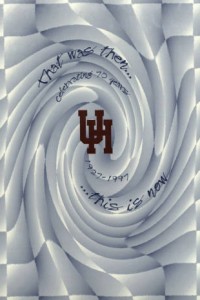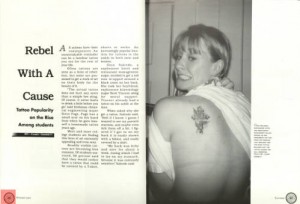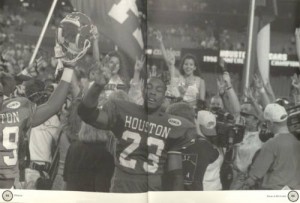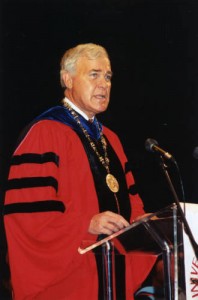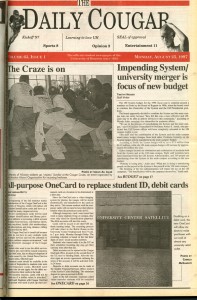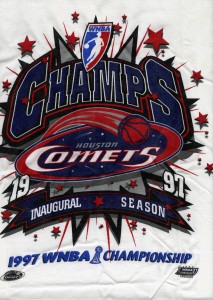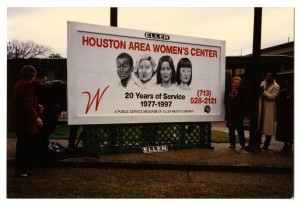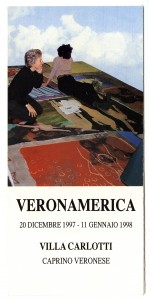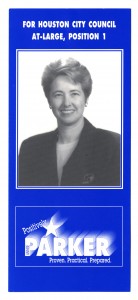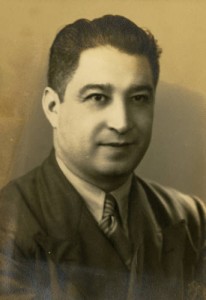
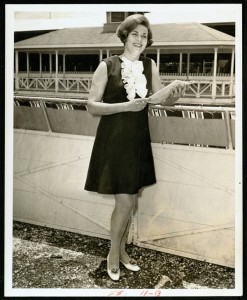
Betty Jukes, President of the Houston Junior Woman’s Club (1968, Betty C. Jukes Papers)
The following comes to us courtesy of Julia Taylor, Graduate Fellow for the Carey C. Shuart Women’s Archive & Research Collection.
This week marks the opening of three new collections from the Carey C. Shuart Women’s Archive and Research Collection, highlighting the lives and accomplishments of three Houston women—Betty C. Jukes, Claudia Kolker, and Marcella Perry. The University of Houston is proud to feature these diverse collections surrounding these very different, historically significant women.
The first finding aid belongs to the Betty C. Jukes Papers. Jukes worked for more than fifty years as an event planner, philanthropic fundraiser, and patron of the arts in Houston and beyond. She founded the Houston Junior Woman’s Club in 1968, and is a lifelong member of The Woman’s Club of Houston. Betty served as president of both organizations, and was also involved in the West Point Cadet Glee Club’s Houston performances. Betty even coordinated a World Wildlife Event where Prince Philip, Duke of Edinburgh, was the guest of honor!
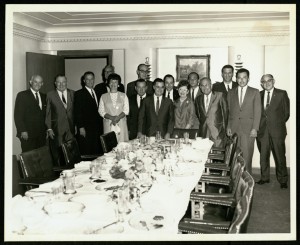
Marcella Perry and others enjoy a breakfast with Mayor Louie Welch (1965, Marcella Perry Papers)
The Claudia Kolker Papers, the second collection to be released to the public this week, catalogues the journalism and authorship of a Claudia Kolker, a journalist who has served as bureau chief for the Los Angeles Times, on the editorial board of the Houston Chronicle, and more. Her work has been featured in The Washington Post, The Boston Globe, The Economist, O: The Oprah Magazine, Slate, and Salon. She has reported from El Salvador, Mexico, India, and the Caribbean on politics, religion, and more. In 2011, she published her first book, titled The Immigrant Advantage: What We Can Learn from Newcomers to America about Health, Happiness and Hope. The collection contains Kolker’s research material and drafts of her book and an extensive catalogue of her published articles.
The papers of Marcella Perry are now also available to the public. Perry, a Houston Heights resident, was appointed to the board of directors of Reagan State Bank in 1950, making her one of the first female bank executives in Houston. In 1973, Marcella was appointed by Houston City Council to serve as the city’s first female commissioner of the Port of Houston Authority. She also served on the board of regents for Texas Woman’s University and was politically active for much of her life. Perry’s collection includes photographs, correspondence, and press clippings related to her work as a bank executive and Port of Houston commissioner.
Come by the reading room (located on the second floor of MD Anderson Library) to view these exciting new additions to the Carey C. Shuart Women’s Archives and Research Collection! For any inquiries about these collections, please contact archivist Vince Lee.
The Beloit College Mindset List, a must-read for anyone who wants to feel time quickly slipping away, was recently published for the incoming collegiate freshman class, the majority of which were born in that magical year of 1997 (?!). While it might make some of us feel just a little bit older, the list is worth a read and always provides some eye-opening perspective.
Ron Nief, Tom McBride, and Charles Westerberg (the creators of the list) provide some real marvels, reminding us that, “Among those who have never been alive in their lifetimes are Princess Diana, Notorious B.I.G., Jacques Cousteau, and Mother Teresa.” They came into the world around the same time as Dolly the sheep and Michael “Prince” Jackson, Jr. In addition, these young’uns have never licked a postage stamp (#3) and, frankly, it can get a little confusing when old people say, “around the turn of the century” (#17). The one that makes these old bones ache a little more this evening? “The eyes of Texas have never looked upon The Houston Oilers.” (#26)
In a salute to the University of Houston Cougars Class of 2019, we have gone digging through the archives and share with you a few highlights from the year 1997 housed here at your University of Houston Special Collections.
And, no, we’re not trying just to make you feel old.
- In 1997 UH celebrated its 70th anniversary, visualized here on the cover of the Houstonian. “That was then… this is now.” (Houstonian Yearbook Collection)
- Rebel With A Cause: The 1997 Houstonian explores the rising popularity of tattoos among students. (Houstonian Yearbook Collection)
- Featured in the 1997 Houstonian is the 1996 Cougar Football team. Playing most of their home games in the ol’ Astrodome, the Coogs finished the season 7-5, winning a share of the C-USA title, and earning a Liberty Bowl berth. In 1997, however, the team finished a disappointing 3-8. (Houstonian Yearbook Collection)
- Dr. Arthur K. Smith became the sixth Chancellor of the University of Houston System and the 11th president of the University of Houston on April 1, 1997. He was the first to hold the titles of chancellor and president simultaneously. (UH Photographs Collection)
- The Daily Cougar welcomed students back with news of a new “OneCard” allowing students “to make purchases without cash at almost any university retail outlet.”
- The WNBA debuted in 1997 and the Houston Comets would go on to win the first of three straight championships. (Houston Comets Memorabilia Collection)
- Bling-bling! Pen & Pixel Graphics captured the aesthetic of 1997 in album and promotional artwork. (Pen & Pixel Graphics, Inc. Records)
- The Houston Area Women’s Center celebrated their 20 year anniversary in 1997. (Houston Area Women’s Center Photographs)
- The Houston Gorilla Girls opened “Veronamerica” in Italy, December 1997. (Houston Gorilla Girls)
- In 1997 Annise Parker won a runoff election for Houston City Council At-Large position 1, becoming Houston’s first openly gay elected official. (Annise Parker Papers)
The following piece appears courtesy of Dan Johnson, 2013 Mosaic Fellow, wherein he provides a look at a sampling of projects benefiting from his internship with the University of Houston Special Collections.
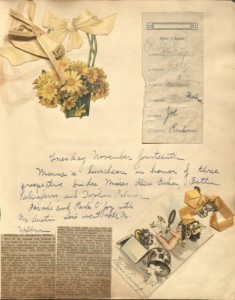
A full dance card (Gladys Ewing’s 1911 Houston Society Scrapbook, The Ewing Family Papers)
I was selected as a Mosaic Fellow in the Fall of 2013 by the Association of Research Libraries and the Society of American Archivists. I’m presently a MSLS student at the University of North Texas, studying Archival Studies and Digital Image Management. The Mosaic Fellowship included an internship component, pairing up fellows with host ARL institutions; I was glad to have the opportunity to intern here at UH Special Collections since September 2014. I’ve since had the pleasure of working on a variety of special projects, working hands on with archival materials.
I first started a digital audit of the Ewing Family Papers, comparing the physical archival collection to its finding aid and existing digital collection. In that review of the Ewing family scrapbooks, I worked with Valerie Prilop, Digital Collections Librarian, and we discovered that the finding aid for one of the scrapbooks provided descriptions for only the front side of each scrapbook page, but did not describe the reverse side, while the digital collection had page-level descriptions for both front and back sides of the pages. Ultimately, we were able to identify places where the finding aid could be improved, and we made some recommendations to combine two digital collections, one per scrapbook, into a single consolidated digital collection, a project for a later date.
I then started a project under the guidance of University Archivist Mary Manning, processing and describing additions to the William C. Moffit Papers. The collection was originally donated by Dr. Moffit himself, but several additions were later donated by his wife and family after he passed away. I was able to process and describe some additional manuscript parts, published musical arrangements, and Patterns of Motion training materials, among other things. Working with a member of the faculty from the School of Music who was intimately familiar with Dr. Moffit’s work helped me better describe and arrange the materials in a way that will make the most sense to researchers using this collection.
I started work on a third project with Hispanic Collections Archivist Lisa Cruces, auditing the physical material of the Alonso S. Perales Papers and comparing the physical archival collection to the finding aid. There were a handful of items in the physical collection that were not reflected in the finding aid, and I have been correcting the finding aid to more faithfully represent the collection.
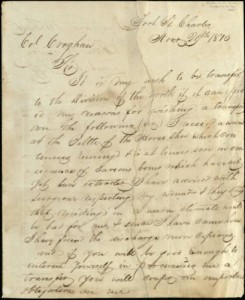
Request for transfer to a unit in the north signed by Sam Houston (November 29, 1813, Early Texas Documents Collection)
Most recently, I’ve been given the opportunity to work with Librarian Emerita Pat Bozeman on a project transcribing and contextualizing some handwritten letters. Two of these items were taken from the Early Texas Documents collection. One item is a letter from Sam Houston written after he was wounded in the Battle of Horseshoe Bend. It documents his request to be transferred from New Orleans to a more northern location upon the advice of several physicians. Another item is a letter that highlights Stephen F. Austin’s efforts to gather support from the United States government and people for Texas Independence and was written in Nashville, Tennessee days before Texas declared independence from Mexico. Working intimately with historical documents such as these has been a very exciting and rewarding experience.
The following comes to us courtesy of Julia Taylor, Graduate Fellow of the Carey C. Shuart Women’s Archive and Research Collection.
While Friday’s SCOTUS ruling on marriage equality marks a milestone in the struggle for LGBTQIAP rights, Special Collections’ booth at this year’s Houston Pride documented the genealogy of LGBT activists who set the stage for this historic win.
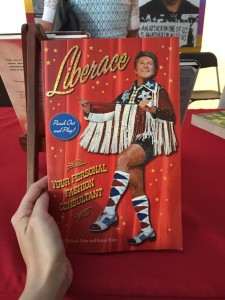
Edward Lukasek’s copy of Liberace: Your Personal Fashion Consultant, a book of Liberace paper dolls emblazoned with life mottos, was a crowd-pleasing favorite.
This year’s Pride festival and parade took place in downtown Houston instead of the usual shady Montrose locale, making the air-conditioned atmosphere of the LGBT History tent a welcome respite from the Texas heat. Special Collections proudly exhibited rare books and artifacts from the Edward Lukasek Gay Studies Collection and the Norma Lee Gay Studies Collection, as well as papers and ephemera from the Houston Area NOW Collection, the Debra Danburg Papers, and the Kanellos Latino Literary Movement Book Collection. Library staff and volunteers stood by to answer questions and show support as families, couples, and friends perused the display of historical and literary materials.
The LGBT history tent, which was sponsored by AT&T, also housed exhibits from Rice University Special Collections, the Botts Collections of Lesbian, Gay, Bisexual, and Transgender History, the Houston Public Library, and the Old Lesbian Oral Herstory Project. To learn more about the history of Houston Pride, visit their website.
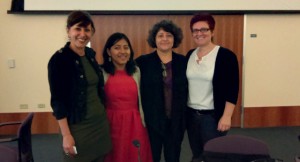
Dr. Maria Cotera (left) alongside panelists Lisa Cruces, Patricia Hernandez, and Dr. Carolina Villaroel
The University of Houston recently hosted Dr. Maria Cotera of the University of Michigan and her talk, “Decolonizing the Archive: Chicana por mi Raza and the Challenge of Digital Humanities.” Dr. Cotera’s talk focused on her work with Chicana por mi Raza, a public humanities project centered on the collection and digital preservation of archival materials, ephemera, and oral histories that document the development of Chicana feminist thought during the civil rights era. A panel discussion, “Pushing Back: Chicana, Latina, Hispanic Women Preserving our Narratives,” followed Cotera’s talk and featured the founder of Studio One Archive Resource, Patricia Hernandez, Director of Research for Arte Público Press, Dr. Carolina Villaroel, and the first Hispanic Collections Archivist at the University of Houston, our own Lisa Cruces.
Sponsored by a number of organizations on and off campus, Dr. Cotera’s talk was broadly attended and included students, staff, and faculty from UH as well as local universities and high schools. The “digital turn,” Dr. Cotera argues, has allowed for a certain de-centering of authority in the work of scholarly research and the Chicana por mi Raza project establishes a collaborative venue providing broad-based public access to oral histories, correspondence, and out-of-print publications for scholarly research in and out of the classroom. Her work with Chicana por mi Raza represents a challenge to the pedagogy and influence of archival politics, prejudices, and patriarchal legacy of the existing structure. The result is a democratization of the archives and an engagement with communities that have been underrepresented in more traditional research models.
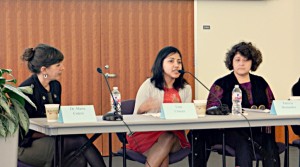
Lisa Cruces (center), Archivist for the Hispanic Collections, addresses a question from the audience during the panel discussion
The panel that followed provided attendees an opportunity to ask questions and hear from women in the field with a variety of traditional and non-traditional archival backgrounds address the subtleties, nuance, and challenges of preserving the historical narratives in this new landscape. As Archivist for the Hispanic Collections here at UH, Cruces certainly has faith in aspects of the traditional archival models, but pointed out that Cotera’s work necessitates the bringing together of multiple vested interests and provides a great opportunity to partner with members of the community outside of the traditional institutional walls. In turn, this work allows a means of introduction to the archives while also allowing participants to look critically as to how historical memory is collected.
If you are interested in the collection and preservation of that historical memory, we encourage you to visit our Hispanic Collections at the University of Houston Special Collections.
